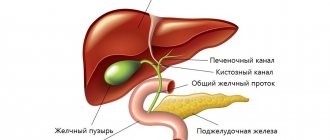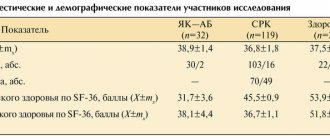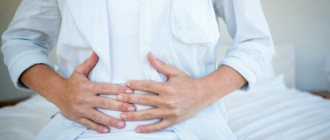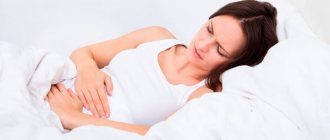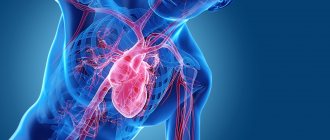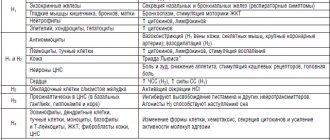The IMMA clinic provides medical services and helps get rid of many diseases, including diseases of the gastrointestinal tract. To do this, we use modern diagnostic equipment, which helps to quickly make an accurate diagnosis, and we also cooperate with experienced and professional doctors who will not only promptly identify a functional intestinal disorder, but also relieve a dangerous illness.
What it is?
Functional gastrointestinal disorder is a separate type of pathology associated with disturbances in the process of digestion of food. It can appear in almost anyone, regardless of age or gender.
The reasons why the disease occurs are divided into two categories: biological predisposition and environmental features leading to this pathology. The latter include stress, poor nutrition and the like.
Symptoms of a functional bowel disorder include:
- Spasms
- Flatulence
- Diarrhea
- Constipation
Often the disease entails the appearance of other, no less acute ailments. Thus, women may experience inflammation of the genitourinary system, and both sexes may develop chronic diseases of the stomach and intestines.
Important! To reduce the risk of developing this disease, it is worth limiting the provoking factors. The latter includes the consumption of spicy, fried or salty foods, it is necessary to eat in small portions, move after eating, and sleep with an elevated headboard.
Seven signs you have irritable bowel syndrome
Imagine the situation: there are unpleasant symptoms, but a medical examination shows that there is no problem. This is what affects the 6 to 18% of people worldwide who suffer from irritable bowel syndrome (IBS) (1).
Abdominal pain
The cause of pain in the syndrome, which is not accompanied by any significant changes in the digestive tract, is problems with the transmission of signals from the intestines to the brain and back. The coordinated functioning of the digestive tract depends on their coordination. When there is interference in the brain-gut signaling pathway, pain occurs. With IBS, it usually appears in the lower abdomen, and after bowel movement it is significantly relieved.
How to make it easier?
A diet based on limiting the consumption of certain fruits, vegetables, sweets, milk and dairy products, legumes, and flour helps reduce pain in IBS. In addition, the doctor may recommend antispasmodic drugs that specifically relieve pain in the intestines.
Diarrhea or constipation
Impaired intestinal motility that occurs with IBS leads to changes in stool, and in different directions. In approximately 1/3 of cases, the syndrome is accompanied by weakness (2), or simply diarrhea. As a rule, this increases the frequency of trips to the toilet, according to some data, at least twice as much as normal (3). Another trouble is that the urge can arise suddenly, like a bolt from the blue.
Much more often, with IBS, the intestines contract too slowly, and much more fluid is absorbed from its contents than necessary, which leads to constipation. In such cases, the frequency of bowel movements is less than three times a week. Even when a long-awaited event occurs, it often does not bring relief - IBS is characterized by a feeling of incomplete relief. Sometimes constipation alternates with diarrhea.
How to make it easier?
For diarrhea, your doctor may prescribe antidiarrheal medications. To combat constipation, it is important to drink plenty of fluids, eat foods rich in fiber, and, if the problem persists, use laxatives.
Flatulence
Due to poor digestion in IBS, too much gas is produced in the intestines. As they accumulate, they cause discomfort: many patients consider bloating to be one of the most persistent and painful symptoms of the disease. Flatulence is also becoming the most common manifestation of irritable bowel syndrome, especially in women with a predominance of constipation or a mixed type, when the latter alternates with diarrhea (3).
How to make it easier?
Diet helps reduce the severity of bloating, in particular, reducing the proportion of fruits and vegetables, legumes and other foods in the diet that stimulate gas formation in the intestines. To alleviate the condition of already existing flatulence, drugs that have a so-called carminative effect help: they reduce the surface tension of gas bubbles formed in the intestines, which leads to their rupture. The gas itself is successfully absorbed by the intestinal walls or excreted naturally.
Intolerance to certain foods
In the vast majority of cases, manifestations of IBS are associated with errors in diet. Scientists today do not know why certain foods contribute to the exacerbation of the disease. Obviously, food intolerance has nothing to do with allergies and does not, in fact, cause indigestion, but only becomes a “trigger” of the syndrome. It’s interesting that everyone has their own trigger foods, but there are also some patterns. Pastries and cakes, peas and beans, cabbage and plums, and many other gas-inducing foods that contain lactose or gluten can cause a flare-up of IBS.
How to make it easier?
The only solution to this problem is to identify trigger foods and reduce their share in the diet.
Fatigue and sleep problems
In approximately half of cases, IBS is accompanied by fatigue (4), low endurance, which limits opportunities both at work and in everyday life, and the more difficult it is to cope with stress, the more pronounced the symptoms of the disease can be. At the same time, it is not always possible to have a good rest and sleep: difficulty falling asleep and waking up is another characteristic symptom of IBS. By the way, if you spend half the night trying to sleep, it is likely that the next day the troubles will be compounded by an exacerbation of characteristic intestinal problems.
How to make it easier?
If fatigue and insomnia due to IBS are your case, most likely you will have a hard time without the help of a competent neurologist.
Anxiety and depression
It is still unclear what comes first: the symptoms of IBS, which lead to emotional distress, or, on the contrary, stress, which triggers intestinal dysfunction. However, it is clear that those who suffer from IBS are 50% more likely to have an anxiety disorder and 70% more likely to have mood disorders such as depression than those with normal bowel function (5). These are such serious numbers that every person experiencing IBS should carefully monitor their psycho-emotional state and if, for example, depressed mood, loss of self-confidence, unreasonable feelings of guilt, mood swings, or anxiety appear, immediately consult a psychiatrist.
How to make it easier?
In this situation, it is better not to rely on the help of “folk methods” for improving mood - they can only aggravate the condition. Antidepressants and anti-anxiety drugs, which should be prescribed by a doctor, can provide real help.
Sources:
- Sperber AD et al. The global prevalence of IBS in adults remains elusive due to the heterogeneity of studies: a Rome Foundation working team literature review // Gut. — 2017; 66(6):1075–1082.
- Camilleri M. Intestinal Secretory Mechanisms in Irritable Bowel Syndrome–Diarrhea // Clinical Gastroenterology and Hepatology. — 2015; 13(6):1051–1057.
- Portincasa P. et al. Pan-enteric dysmotility, impaired quality of life and alexithymia in a large group of patients meeting ROME II criteria for irritable bowel syndrome // World journal of gastroenterology. - 2003; 9 (10): 2293.
- Han CJ, Yang GS Fatigue in irritable bowel syndrome: a systematic review and meta-analysis of pooled frequency and severity of fatigue // Asian Nursing Research. - 2016; 10 (1): 1–10.
- Janssens KAM et al. Mood and anxiety disorders in chronic fatigue syndrome, fibromyalgia, and irritable bowel syndrome: results from the LifeLines cohort study // Psychosomatic medicine. — 2015; 77(4):449–457.
Marina Pozdeeva, pharmacist, medical journalist
Photo depositphotos.com The author’s opinion may not coincide with the opinion of the editors
Diseases in children
In children, symptoms of functional bowel disorder manifest differently and are stronger. In particular, even the most common diarrhea in children can lead to a serious condition for the child and require hospitalization. If this does not happen, the consequences of diarrhea are still much worse tolerated compared to an adult patient.
In children and adults, damage to the intestines equally strongly affects the functioning of the immune and endocrine systems, which can lead to lethargy, apathy, and frequent colds and other diseases.
Important! In childhood, it is recommended to undergo regular preventive appointments and examinations. Even if they have not yet fully manifested themselves, their detection and elimination at an early stage can seriously make life easier in the future.
Treatment of functional gastrointestinal disorders
Complex treatment includes dietary recommendations, psychotherapeutic measures, drug therapy, and physiotherapeutic procedures.
General recommendations for constipation: abolition of constipation medications, foods that contribute to constipation, intake of large amounts of fluid, food rich in ballast substances (bran), physical activity and elimination of stress.
If diarrhea predominates, the intake of coarse fiber into the body is limited and drug therapy (imodium) is prescribed.
If pain predominates, antispasmodics and physiotherapeutic procedures are prescribed.
Diagnostics
If functional disorders of the gastrointestinal tract acquire chronic forms, it is necessary to conduct an examination by a gastroenterologist, which will help to find out the cause of poor health.
You may also need to consult other specialists. For example, a nutritionist who will help you choose the most suitable diet.
Diagnostics proceeds in several stages. The first is an initial visual examination of the patient and collection of anamnesis.
Then you need to undergo an examination. These include stool and urine analysis, colonoscopy, gastroscopy, abdominal ultrasound, computed tomography and a number of other procedures.
After diagnosis, treatment for functional gastrointestinal disorders is prescribed. Psychotherapists, physiotherapists, endocrinologists, and nutritionists are involved in treatment.
Medicinal methods of treatment of the disease are prescribed, special attention is paid to the rules of food intake, physical activity, work and rest schedule. Only compliance with all these components can guarantee relief from the disease.
Causes
The etiology of functional dyspepsia is still unclear. Many possible causes play an important role in the mechanism of formation of clinical manifestations of the disease. Risk factors for FD include:
- Psycho-emotional stress, stress.
- Overstretching of the stomach walls (frequent overeating).
- Slowing of upper gastrointestinal motility.
- Colonization of the stomach by the bacterium Helicobacter pylori.
- High concentration of hydrochloric acid in gastric juice.
- Insufficient production of digestive enzymes.
- Improper diet and poor quality products.
- Taking medications that have a detrimental effect on the gastric mucosa (for example, NSAIDs).
Prevention and healthy lifestyle
The lifestyle of a modern city dweller can hardly be called healthy or conducive to maintaining good health. That is why preventive measures are recommended.
Moreover, this is true for both children and adults.
To maintain the body in good condition, it is recommended to take care of your diet. Eliminate junk food from it, reduce the amount of fried and salty foods. Try to purchase products from trusted manufacturers and pay attention to the composition.
It is also recommended to move as much as possible. This improves the general condition of the body.
Classification
Depending on the predominance of one or another symptom of the disease. The following clinical forms of functional dyspepsia are distinguished:
- Ulcer-like. It manifests itself as hunger pains that go away after eating. Pain can also be relieved by taking medications that reduce stomach acidity.
- Reflux. Characterized by heartburn, belching and epigastric pain. Symptoms intensify against the background of psycho-emotional stress, as well as when changing body position - from vertical to horizontal or when the body is tilted forward.
- Dyskinetic. This clinical form is characterized by complaints of early satiety, nausea, even vomiting, and flatulence.
- Non-specific. With this form of dyspepsia, the patient is bothered by a variety of complaints that are difficult to combine into a single symptom complex characteristic of a particular variant of the disease.
Rotavirus infection and its symptoms
Rotavirus infection most often occurs in children aged six months to two years, but can also occur in adults. Notably, adults experience the disease more quickly than children, with mild symptoms. Intestinal flu, also called rotavirus infection, is transmitted through infected dairy products, tactile and airborne droplets. The most vulnerable time for such infections is the period from November to April.
There are several periods of disease functioning: the incubation period lasts up to five days, the acute period lasts up to seven days, and the recovery period of the body lasts up to five days. The onset of the disease is characterized by acute symptoms, such as high fever, spasmodic pain, vomiting, and the development of diarrhea.
You can determine the presence of rotavirus infection by the quality of your stool. In the first days, the stool is characterized by a special liquid consistency and yellow color, and in subsequent days it has a clay-like consistency and yellow-gray color. It is noteworthy that in addition to the symptoms described above, the patient may be bothered by a runny nose, sore throat and cough. Such symptoms are characteristic of the disease in children, but in adults this disease occurs as a common stomach disorder.
Symptoms may be similar to salmonellosis or cholera, so you should definitely consult a specialist to make an accurate diagnosis.
Our services
The administration of CELT JSC regularly updates the price list posted on the clinic’s website. However, in order to avoid possible misunderstandings, we ask you to clarify the cost of services by phone: +7
| Service name | Price in rubles |
| Ultrasound of the abdominal organs (liver, gall bladder, pancreas, spleen) | 3 800 |
| Gastroscopy (videoesophagogastroduodenoscopy) | 6 000 |
| Fluoroscopy and radiography of the stomach | 4 800 |
All services
Make an appointment through the application or by calling +7 +7 We work every day:
- Monday—Friday: 8.00—20.00
- Saturday: 8.00–18.00
- Sunday is a day off
The nearest metro and MCC stations to the clinic:
- Highway of Enthusiasts or Perovo
- Partisan
- Enthusiast Highway
Driving directions
